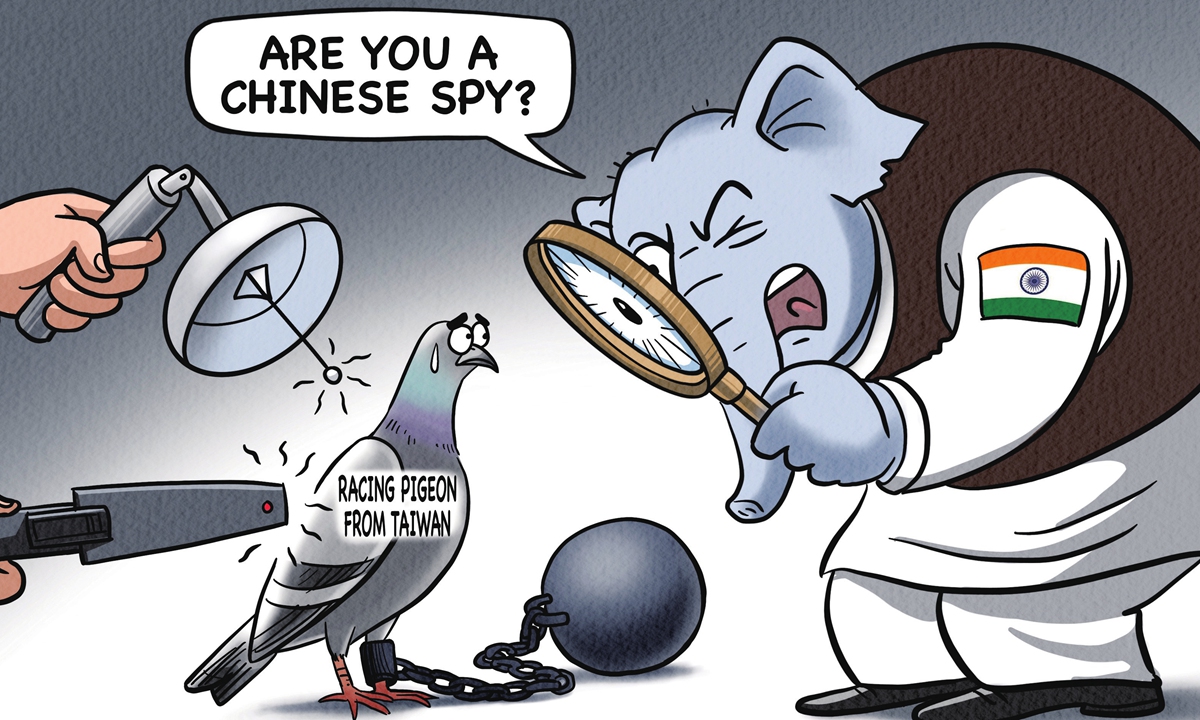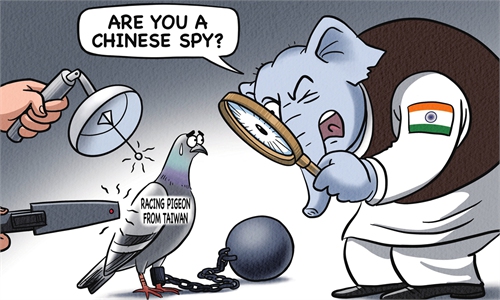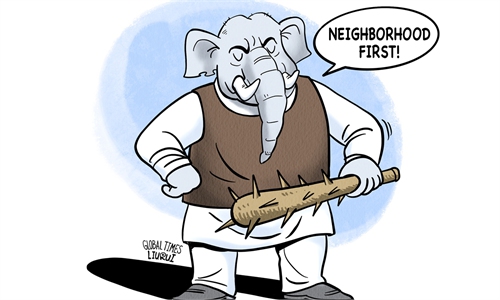India should prioritize what benefits itself and Global South over unwarranted suspicions toward China

Illustration: Liu Rui/GT
The only correct path forward for China and India is to develop their relations in peace, cooperation and good neighborly terms. A better South Asia would involve evenly distributed relations, with countries treating each other as equals.
Recently, a pigeon suspected of spying for China and held for eight months was released by Indian officials when it was discovered that the pigeon was only a racing pigeon from China's Taiwan region.
This whole episode reflects India's fear of China. Sometimes, India is concerned about China's rapid development. While there is a certain level of economic competition between China and India, Indian officials should realize the stark differences between the two economies, as well as the unique challenges and opportunities each presents. To a large extent, China and India can complement each other rather than simply competing due to disparities in size, scale, economic and technological sophistication between the two largest populations in the world.
Philosophically speaking, China and India should not fear each other. While acknowledging border disputes between the two nations, it is crucial to emphasize that these disputes were not instigated by either China or India. Instead, they were a consequence of actions by the British Empire during its imperial rule.
Neither China nor India should be held hostage by the adverse legacy left by the British Indian Empire. Moving beyond this legacy is imperative. Focus should be placed on essential matters such as fostering mutual understanding, cooperation, and resolving border disputes through peaceful negotiations and diplomacy. This approach allows China and India to liberate themselves from the shadows of colonialism and concentrate on what truly matters for their mutual benefits.
I've coined a term called "super population" for China and India, which refers to countries with populations above 1 billion. For many years to come, China and India will remain the two "super populations" in the world. This means we need to shoulder a lot of responsibility not only for our own people, but also for mankind as a whole, especially for the Global South. There are more than 150 countries in the world that belong to the Global South, including China and India. The two countries are both among the developing countries, although they have followed very different pathways of economic development and political systems. Eventually, I hope both China and India will be able to make it to the top three economies in the world, becoming shining examples for all Global South countries.
Indian External Affairs Minister S. Jaishankar said on January 30 that India shouldn't "be scared of" China. If we focus on peace, India has no reason to fear China. By prioritizing peace, mutual understanding and people-to-people exchanges between our two nations, the only two "super populations" in the world, we can foster mutual benefit and development. The mighty Himalayas, instead of dividing us, can serve as a bridge between China and India. Cooperation and friendship between our countries will not only boost confidence and morale in the Global South and developing nations, but also contribute to global economic development, peace and stability.
India's sensitive mentality also reflects how it deals with other South Asian countries. India sees itself as an overlord in South Asia, especially to smaller countries like Bhutan, Sri Lanka and the Maldives. It also faces long-standing conflict with Pakistan. However, the only right way to look at relations between India and other South Asian countries is that everyone should be equal. Each country in South Asia, big or small, holds equal membership in the UN and deserves respect. No country should exercise dominance over any of the smaller nations.
From the Chinese perspective, developing good, friendly, neighborly relations with India is absolutely important. At the same time, it is equally important for China to develop good constructive relations with countries like Pakistan, Bangladesh, Bhutan, Sri Lanka and the Maldives. The recent important state visit by the President of the Maldives, Mohamed Muizzu, to China, serves as a compelling example of the need to maintain China's mutually beneficial and equal relations with all countries in South Asia. By doing so, the entire region can experience improved peace and prosperity.
India should prioritize peace, stability and development, and adopt a neighborly approach toward other countries, considering them as partners and potential friends rather than harboring unwarranted suspicions. Furthermore, India should firmly refuse to become a proxy of any other major power in its geopolitical rivalry with China, which could detrimentally affect bilateral relations with China.
The author is a chair professor at Soochow University and Vice President of the Center for China and Globalization. opinion@globaltimes.com.cn



